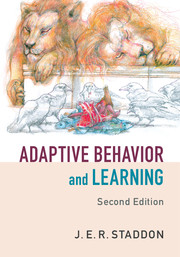Book contents
- Frontmatter
- Contents
- Preface to the second edition
- Acknowledgments
- 1 The evolution, development, and modification of behavior
- 2 Variation and selection: kineses
- 3 Reflexes
- 4 Direct orientation and feedback
- 5 Operant behavior
- 6 Reward and punishment
- 7 Feeding regulation: a model motivational system
- 8 The optimal allocation of behavior
- 9 Choice: dynamics and decision rules
- 10 Foraging and behavioral ecology
- 11 Stimulus control and cognition
- 12 Stimulus control and performance
- 13 Molar laws
- 14 Time and memory, I
- 15 Time and memory, II
- 16 Template learning
- 17 Learning, I
- 18 Models of classical conditioning
- 19 Learning, II
- 20 Learning, III: procedures
- 21 Comparative cognition
- Index
9 - Choice: dynamics and decision rules
Published online by Cambridge University Press: 05 March 2016
- Frontmatter
- Contents
- Preface to the second edition
- Acknowledgments
- 1 The evolution, development, and modification of behavior
- 2 Variation and selection: kineses
- 3 Reflexes
- 4 Direct orientation and feedback
- 5 Operant behavior
- 6 Reward and punishment
- 7 Feeding regulation: a model motivational system
- 8 The optimal allocation of behavior
- 9 Choice: dynamics and decision rules
- 10 Foraging and behavioral ecology
- 11 Stimulus control and cognition
- 12 Stimulus control and performance
- 13 Molar laws
- 14 Time and memory, I
- 15 Time and memory, II
- 16 Template learning
- 17 Learning, I
- 18 Models of classical conditioning
- 19 Learning, II
- 20 Learning, III: procedures
- 21 Comparative cognition
- Index
Summary
Learning in animals is studied mostly by behaviorists of one sort or another. Behaviorists differ among themselves, of course. Radical (Skinnerian) behaviorists look at things a little differently from associative learning (Hullian) behaviorists. And there are cognitive types who favor computer-like metaphors and presumptions about symbolic processing. Nevertheless, all agree in their disdain for the folk psychology of wishes, feelings, and conscious deliberation. No behaviorist would take as a model for choice Charles Darwin's agonizing about whether or not to marry. Darwin wrote copious notes, two months before his engagement to his cousin Emma Wedgwood, listing the pros and cons. A sample:
Marry [pros]:
Children – (if it Please God) [14] – Constant companion,
(& friend in old age) who will feel interested in one, –
object to be beloved & played with. – better than a
dog anyhow. – Home, & someone to take care of
house – Charms of music & female chit-chat. – These
things good for one's health. – [16] but terrible loss of time…
Not Marry [cons]: Freedom to go where one liked – choice of Society
& little of it. – Conversation of clever men at clubs –
Not forced to visit relatives, & to bend in every
trifle. – to have the expense & anxiety of children –
perhaps quarelling – Loss of time. – cannot read in
the Evenings – fatness & idleness…
This is choice indeed! No one would imagine that animals choose like this. But folk psychology often slips in unannounced. In his famous matching-law experiment, to make his procedure work, Richard Herrnstein added what is called a changeover delay (COD): neither response could be rewarded for a second or two after each change from one response to the other. The reason was to prevent a third response: switching. Matching is got only when switching is suppressed by the COD: “The precise correspondence between relative frequency of responding and relative frequency of reinforcement broke down when the COD was omitted.”
But a little thought reveals that the response of “switching” is entirely hypothetical. It was derived neither from direct observation nor from proven theory. It came from intuition. If you, like the pigeon, had to choose repeatedly between two options, you might well consider “switching” as a third option to be assessed for payoff along with the other two.
Information
- Type
- Chapter
- Information
- Adaptive Behavior and Learning , pp. 242 - 286Publisher: Cambridge University PressPrint publication year: 2016
